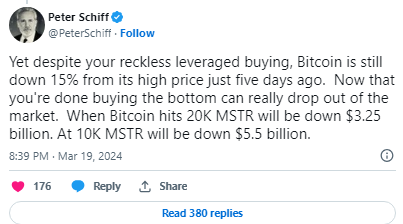The allure of Bitcoin continues to spark debate, with proponents touting its skyrocketing value and critics warning of a potential bubble. This weekend, a prominent crypto advocate and CEO, Michael Saylor, reignited the discussion by showcasing Bitcoin’s impressive gains compared to traditional assets.
Bitcoin Debate: Saylor Vs. Schiff
Saylor, the chairman of MicroStrategy, a business intelligence firm, shared a chart highlighting the leading crypto’s over 430% growth against a backdrop of more modest gains from established investment options like the S&P 500 (56%) and gold (7%). This, according to Saylor, underscores Bitcoin’s position as a dominant investment force.
#Bitcoin is Winning. pic.twitter.com/3ESQRHKEDa
— Michael Saylor
(@saylor) March 23, 2024
However, not everyone is convinced. Renowned economist Peter Schiff, a vocal critic of cryptocurrencies, remains unconvinced. He expressed concern over Saylor’s aggressive investment strategy, particularly MicroStrategy’s recent acquisition of over 9,000 BTCs. Schiff emphasizes the inherent volatility of digital currencies, highlighting the potential for significant losses, especially considering MicroStrategy’s leveraged purchases.
MicroStrategy has acquired an additional 9,245 BTC for ~$623.0M using proceeds from convertible notes & excess cash for ~$67,382 per #bitcoin. As of 3/18/24, $MSTR hodls 214,246 $BTC acquired for ~$7.53B at average price of $35,160 per bitcoin. https://t.co/oeYJGgiuy0
— Michael Saylor
(@saylor) March 19, 2024

Saylor, however, remains unfazed by the recent price dip (nearly 12%) following Bitcoin’s record high. He views volatility as a natural market phenomenon, even coining the phrase “volatility is vitality” to emphasize its role in a healthy market. This confidence extends to MicroStrategy’s investment strategy. The company has significantly increased its holdings, now totaling over 214,000 BTC, showcasing their long-term faith in the digital currency.
The contrasting views of Saylor and Schiff represent the ongoing debate surrounding Bitcoin. Proponents like Saylor point to its historical growth trajectory and its potential to disrupt traditional financial systems. They believe the digital asset’s limited supply (21 million coins will ever be mined) makes it a valuable hedge against inflation, similar to gold.
Risks And Regulations
However, skeptics like Schiff highlight the risks associated with BTC price fluctuations. Unlike established assets with underlying fundamentals like company performance or resource scarcity, Bitcoin’s value relies heavily on speculation and market sentiment. A sudden shift in investor confidence could trigger a dramatic price drop, leading to significant losses for investors like MicroStrategy.
Further complicating the picture is the evolving regulatory landscape surrounding cryptocurrencies. Governments worldwide are still grappling with how to regulate this new asset class. Stringent regulations could stifle innovation and adoption, potentially hindering Bitcoin’s future growth.
Featured image from Pexels, chart from TradingView









